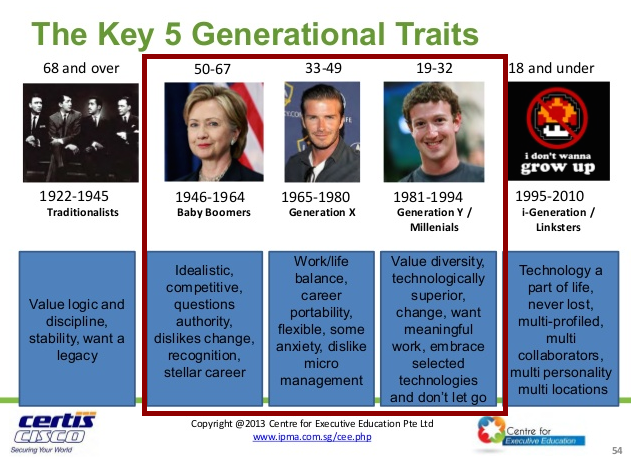
Arak Rattanawijittakorn/Shutterstock.com
There are three main generations in the workforce today:
- The "overstudied" baby boomers (born 1946-1964)
- Overly "coddled" millennials (born 1981-1997)
- The nearly totally ignored Gen Xers (born 1965-1980)
I am a Gen Xer. And the fact that I am ignored by the media has been covered many times, including this TIME cover story in 1997.

This is not to bemoan such a sad state of affairs. Nor is it to enlighten you about all things X. And, of course, one would be stupid to reduce people to simplistic generational categories.
Rather, it is to highlight a problem Gen Xers face with respect to workplace diversity, precisely because we are so little-studied and understood: our communication style. Compared with "political" baby boomers and "polite" millennials, Gen Xers are perceived as "rude," "skeptical," "cynical."
Most of the time, discussions of generational difference do not focus on language. Here is typical depiction (emphasis on boomers, Xers and millennials is mine).

But it is important to talk about differences in communication style, because as we all know, the impact of miscommunication on workplace productivity is significant. Not the least of the potential problems is that employees can make costly and dangerous mistakes.
The impact of miscommunication on an individual's career may be invisible, but it is personal and it is costly. Which is probably why Harvard Business Review has an entire section on its website specifically devoted to this.
Unfortunately for the Gen Xer, particularly the Xer who is working in a team-based organization, conversations about diversity in communication style tend to revolve around cross-cultural issues or those relating to gender.
Given that the unique constellation of Gen X characteristics tends to be ignored in the diversity conversation, and given that Xers' unique style of communication is essentially a nonissue, it follows that this generational cohort is bound to suffer from being "branded" negatively in some very unfair ways.
The solution to this problem does not lie in "consciousness raising," from my point of view. It isn't a matter of one group trying to oppress another. Rather, it's about taking personal responsibility for understanding that our colleagues may have trouble understanding why we talk the way we do.
It's about recognizing that no matter how many achievements you can list on your résumé, your communication style may actually tick people off. And that you sometimes have to temper yourself to get along with them.
Copyright 2015 Dannielle Blumenthal, Ph.D. The opinions expressed are her own, and the content of this post is not intended to represent any federal agency or the government as a whole.
(Image via Arak Rattanawijittakorn/Shutterstock.com)






